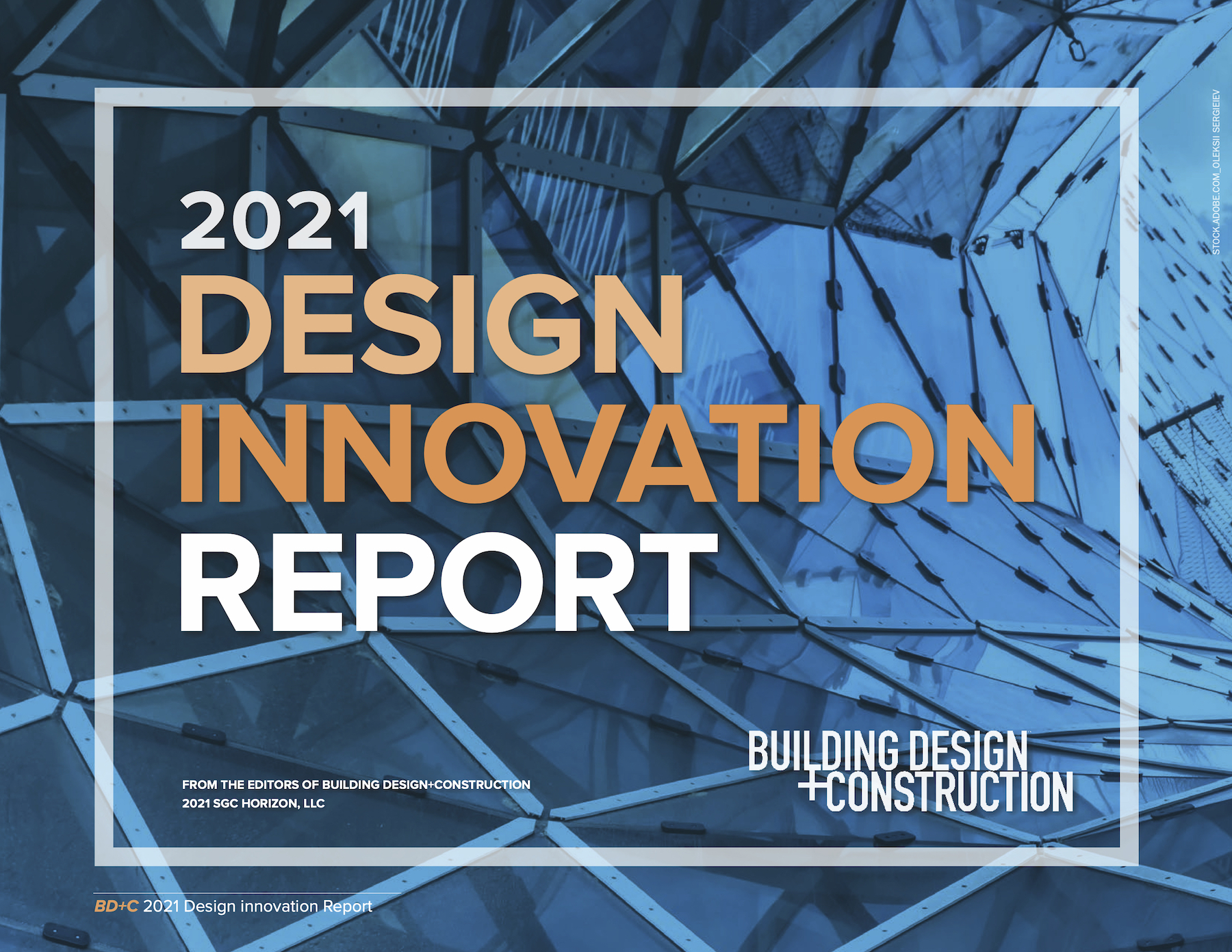Have you wondered why some design ideas soar and others crash? Why clients embrace or reject a design concept? Whether your firm’s designs are trendsetters or followers?
To get answers to those and other design-related questions, Building Design+Construction polled the industry earlier this year, and received responses from 342 companies, most of which were architects, engineers, and contractors. The result of that survey is BD+C’s 2021 Design Innovations Report, whose 22 pages explore the complexities behind creating, pitching, and executing new ideas.
The purpose of this report is to:
- Uncover where AEC firms focus their efforts and how they stimulate new ideas;
- Gauge how receptive owners and developers are to project ideas, and why;
- Reveal which design trends—such as modularity, or the use of mass timber—are (or aren’t) catching on
- Examine whether firms’ idea machines are keeping pace with the rate of change in business, lifestyle, and society.
Some takeaways from the report include:
- The biggest factors that result in an innovation’s success or failure are cost, client buy-in, and communication;
- Several typologies—offices, education, multifamily, healthcare—are glaring in their need for innovation, even as these same building types have been cited as design leaders in the past;
- Contractors are often their clients’ gatekeepers when it comes to deciding which design innovations fly;
- Mentoring and training are the primary catalysts within AEC firms for nurturing new ideas;
- The coronavirus pandemic accelerated the need for design innovations, especially for indoor air quality and wellness.
The report makes clear that there’s no shortage of ideas or new products, and that “innovation” and “technology” are often thought of together.
Download BD+C’s 2021 Design Innovation Report (short registration required)
Related Stories
Urban Planning | Apr 12, 2023
Watch: Trends in urban design for 2023, with James Corner Field Operations
Isabel Castilla, a Principal Designer with the landscape architecture firm James Corner Field Operations, discusses recent changes in clients' priorities about urban design, with a focus on her firm's recent projects.
3D Printing | Apr 11, 2023
University of Michigan’s DART Laboratory unveils Shell Wall—a concrete wall that’s lightweight and freeform 3D printed
The University of Michigan’s DART Laboratory has unveiled a new product called Shell Wall—which the organization describes as the first lightweight, freeform 3D printed and structurally reinforced concrete wall. The innovative product leverages DART Laboratory’s research and development on the use of 3D-printing technology to build structures that require less concrete.
Market Data | Apr 11, 2023
Construction crane count reaches all-time high in Q1 2023
Toronto, Seattle, Los Angeles, and Denver top the list of U.S/Canadian cities with the greatest number of fixed cranes on construction sites, according to Rider Levett Bucknall's RLB Crane Index for North America for Q1 2023.
University Buildings | Apr 11, 2023
Supersizing higher education: Tracking the rise of mega buildings on university campuses
Mega buildings on higher education campuses aren’t unusual. But what has been different lately is the sheer number of supersized projects that have been in the works over the last 12–15 months.
Architects | Apr 10, 2023
Bill Hellmuth, FAIA, Chairman and CEO of HOK, dies at 69
William (Bill) Hellmuth, FAIA, the Chairman and CEO of HOK, passed away on April 6, 2023, after a long illness. Hellmuth designed dozens of award-winning buildings across the globe, including the Abu Dhabi National Oil Company Headquarters and the U.S. Embassy in Nairobi.
Contractors | Apr 10, 2023
What makes prefabrication work? Factors every construction project should consider
There are many factors requiring careful consideration when determining whether a project is a good fit for prefabrication. JE Dunn’s Brian Burkett breaks down the most important considerations.
Mixed-Use | Apr 7, 2023
New Nashville mixed-use high-rise features curved, stepped massing and wellness focus
Construction recently started on 5 City Blvd, a new 15-story office and mixed-use building in Nashville, Tenn. Located on a uniquely shaped site, the 730,000-sf structure features curved, stepped massing and amenities with a focus on wellness.
Smart Buildings | Apr 7, 2023
Carnegie Mellon University's research on advanced building sensors provokes heated controversy
A research project to test next-generation building sensors at Carnegie Mellon University provoked intense debate over the privacy implications of widespread deployment of the devices in a new 90,000-sf building. The light-switch-size devices, capable of measuring 12 types of data including motion and sound, were mounted in more than 300 locations throughout the building.
Affordable Housing | Apr 7, 2023
Florida’s affordable housing law expected to fuel multifamily residential projects
Florida Gov. Ron DeSantis recently signed into law affordable housing legislation that includes $711 million for housing programs and tax breaks for developers. The new law will supersede local governments’ zoning, density, and height requirements.
Energy Efficiency | Apr 7, 2023
Department of Energy makes $1 billion available for states, local governments to upgrade building codes
The U.S. Department of Energy is offering funding to help state and local governments upgrade their building codes to boost energy efficiency. The funding will support improved building codes that reduce carbon emissions and improve energy efficiency, according to DOE.
















